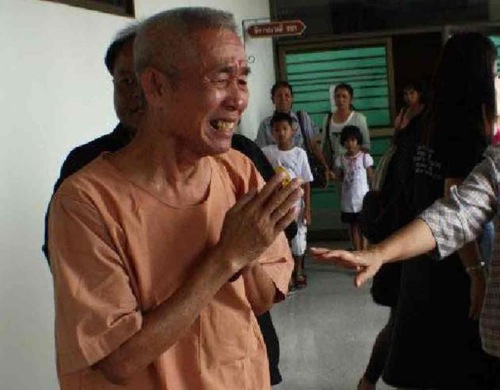
AP reports today:
A Thai man in his 60s who became known as “Uncle SMS” after he was convicted of defaming Thailand’s royal family in mobile phone text messages has died while serving his 20-year prison term, his lawyer said Tuesday.
The case of Amphon Tangnoppakul, a grandfather who had suffered from mouth cancer, drew attention to Thailand’s severe lese majeste laws last November when he received one of the heaviest-ever sentences for someone accused of insulting the monarchy.
And:
Amphon was arrested in August 2010 and accused of sending four text messages to a government official that were deemed offensive to the queen. He denied sending them, however, and said he didn’t even know how to use the SMS function on his telephone to send texts.
He wept during his court proceedings, saying, “I love the King.”
AFP says:
A 62-year-old Thai man considered a “prisoner of conscience” by Amnesty International for his 20-year sentence for royal defamation has died in jail, his lawyer said Tuesday
And:
“He had come to represent the enormous degree of injustice that was this lese majeste law and yet he wanted nothing more than to be a grandfather and to enjoy his old age,” Amnesty researcher Benjamin Zawacki told AFP.
Reuters reports:
A Thai man who was jailed for 20 years after being found guilty of sending text messages disrespectful to Queen Sirikit has died in jail a few months into his sentence, his lawyer said on Tuesday.
The case last November of Amphon Tangnoppaku, 61, who the media nicknamed “Uncle SMS”, had stoked a debate about the harsh sentences imposed in Thailand for lese-majeste, or insulting the king, queen or crown prince.
Prachatai has this:
After being convicted to 20 years in jail for allegedly sending four offensive text messages to the secretary of former PM Abhisit Vejjajiva in November 2011, his lawyers applied for his temporary release several times citing his medical need as he had been suffering from cancer among other illnesses. The latest request was made in February 2012 and it was rejected by the Appeals Court who claimed that “The illness which the defendant claims [as one of the reasons for the bail] does not appear to be life-threatening.”
There’s also a story from The Nation and The Bangkok Post.
And finally, for background info, here’s a BBC story from Nov., when Ampon was convicted.
(All emphasis mine.)
(Image: The Nation.)
Update: There’s also a story from The New York Times.